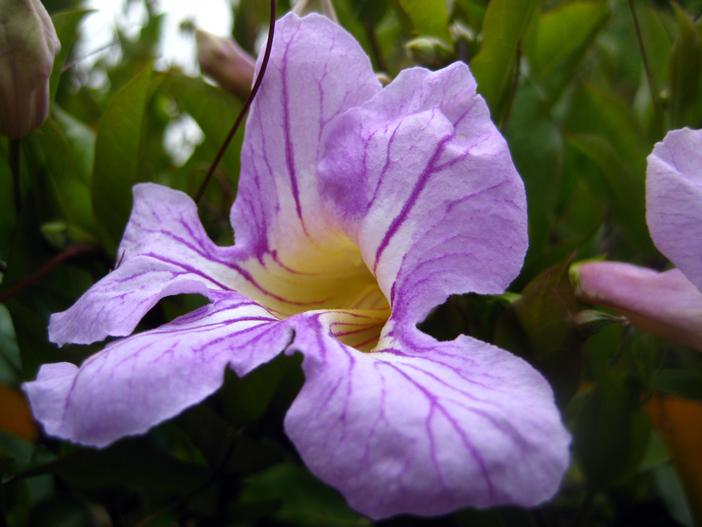Lavender Trumpet Vine
(Bignonia callistegioides)
Lavender Trumpet Vine (Bignonia callistegioides)
/
/

bri weldon
CC BY 2.0
Image By:
bri weldon
Recorded By:
Copyright:
CC BY 2.0
Copyright Notice:
Photo by: bri weldon | License Type: CC BY 2.0 | License URL: https://creativecommons.org/licenses/by/2.0 | Uploader: Tortie tude | Publisher: Wikipedia Commons














Estimated Native Range
Summary
Bignonia callistegioides, commonly known as Lavender Trumpet Vine, is a perennial vine that can be evergreen or deciduous depending on the climate, native to the subtropical and temperate forests of Southern South America, particularly in Argentina and Uruguay. It typically grows to a height and width of 15-20 feet (5-6 meters), with a twining and climbing habit that makes it ideal for trellises, arbors, and fences. The Lavender Trumpet Vine is adorned with clusters of trumpet-shaped, lavender to purple flowers that bloom profusely in the spring and are quite showy, attracting pollinators such as hummingbirds and bees.
This vine is valued for its rapid growth and the ornamental quality of its flowers, which add a splash of color to garden settings. It is used for vertical interest in landscapes, covering unsightly structures, and can also be trained to grow on garden walls. While it thrives in full sun or part shade, it requires well-drained soil and moderate watering, being somewhat drought-tolerant once established. There are no widely known popular cultivars, but the species itself is quite popular among gardeners. Potential problems include susceptibility to pests such as aphids and scale insects. It is not typically invasive but should be monitored to ensure it does not overtake nearby plants or structures.CC BY-SA 4.0
This vine is valued for its rapid growth and the ornamental quality of its flowers, which add a splash of color to garden settings. It is used for vertical interest in landscapes, covering unsightly structures, and can also be trained to grow on garden walls. While it thrives in full sun or part shade, it requires well-drained soil and moderate watering, being somewhat drought-tolerant once established. There are no widely known popular cultivars, but the species itself is quite popular among gardeners. Potential problems include susceptibility to pests such as aphids and scale insects. It is not typically invasive but should be monitored to ensure it does not overtake nearby plants or structures.CC BY-SA 4.0
Plant Description
- Plant Type: Vine
- Height: 15-20 feet
- Width: 15-20 feet
- Growth Rate: Moderate, Rapid
- Flower Color: Purple
- Flowering Season: Spring
- Leaf Retention: Evergreen, Deciduous
Growth Requirements
- Sun: Full Sun, Part Shade
- Water: Medium
- Drainage: Fast
Common Uses
Bee Garden, Bird Garden, Butterfly Garden, Fragrant, Hummingbird Garden, Low Maintenance, Showy Flowers
Natural Habitat
Native to subtropical and temperate forests of Southern South America, particularly in Argentina and Uruguay
Other Names
Common Names: Argentine Trumpet Vine, Love-Charm
Scientific Names: , Clytostoma callistegioides, Bignonia callistegioides, Bignonia speciosa, Cuspidaria callistegioides, Clytostoma uniflorum, Bignonia lindleyi, Bignonia picta, Pithecoctenium callistegioides,
GBIF Accepted Name: Bignonia callistegioides Cham.